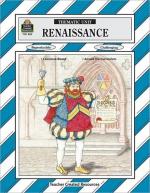|
This section contains 1,519 words (approx. 6 pages at 300 words per page) |

|
Scholasticism.
At the dawn of the Renaissance, philosophy in Western Europe continued to be dominated by the scholastic method, and philosophical examination occurred primarily within Europe's universities. Because philosophy was largely pursued in faculties of theology, theological issues were of primary importance. Scholastic philosophy relied on a method for examining questions logically by weighing opposing viewpoints, propositions, and evidence. In the thirteenth century the scholastic method had reached a high watermark of development, particularly at the hands of thinkers like St. Thomas Aquinas, Albertus Magnus, and St. Bonaventura. Aquinas's achievement, in particular, still ranks as one of the great intellectual edifices of European history, and his Summa Theologiae or Theological Summation remained influential in the later Middle Ages. Thomism proceeded from the assumption that human knowledge might, in large part, be harmonized with divine revelation. In the Renaissance many scholastics continued to examine theological...
|
This section contains 1,519 words (approx. 6 pages at 300 words per page) |

|




